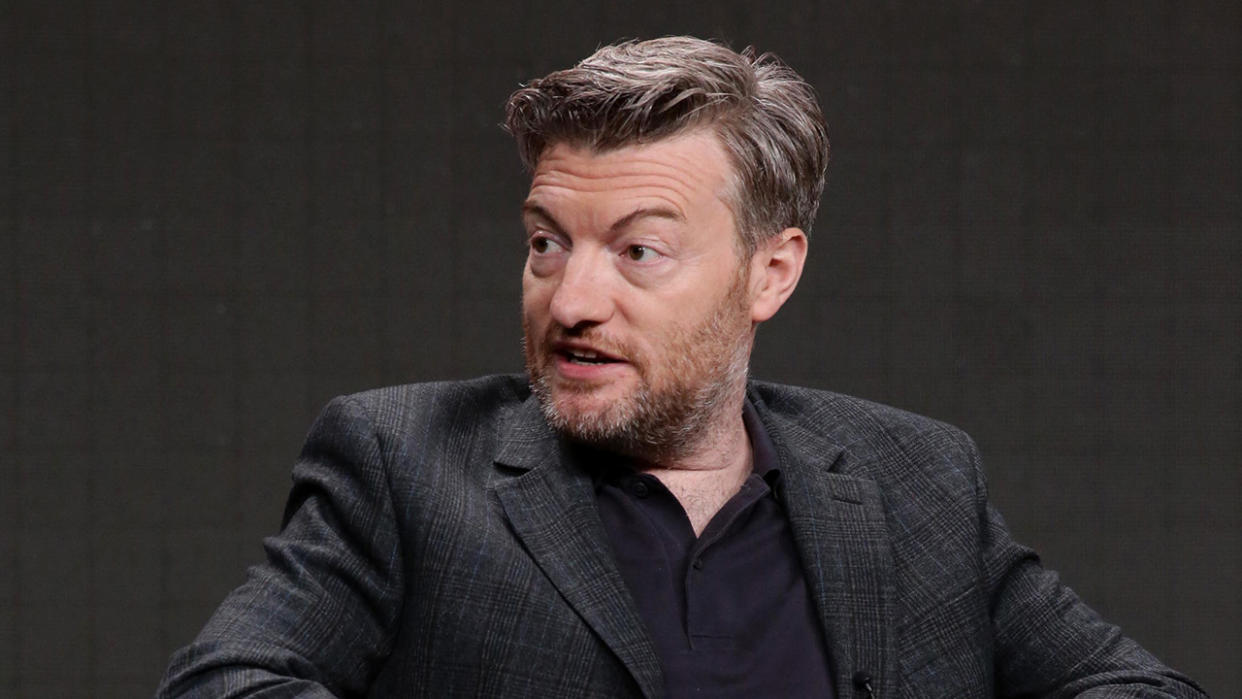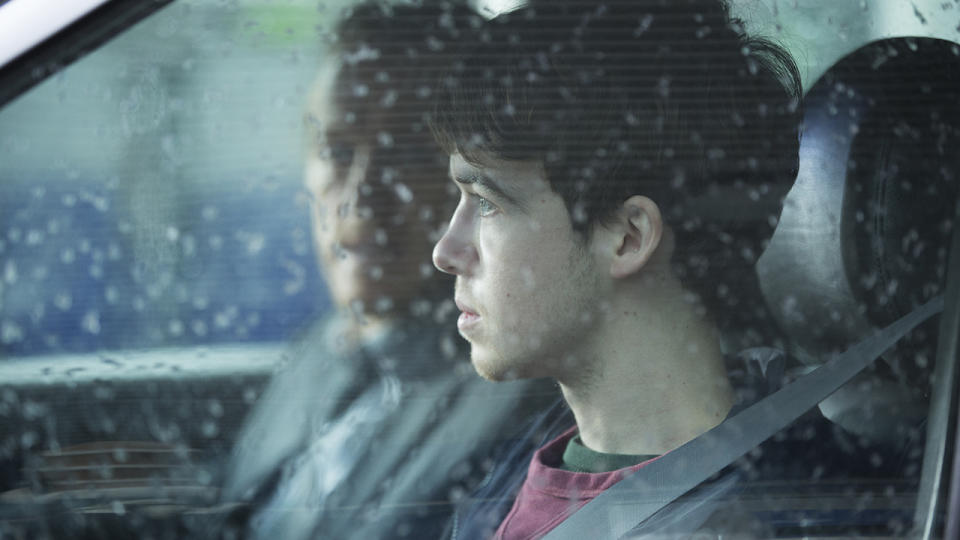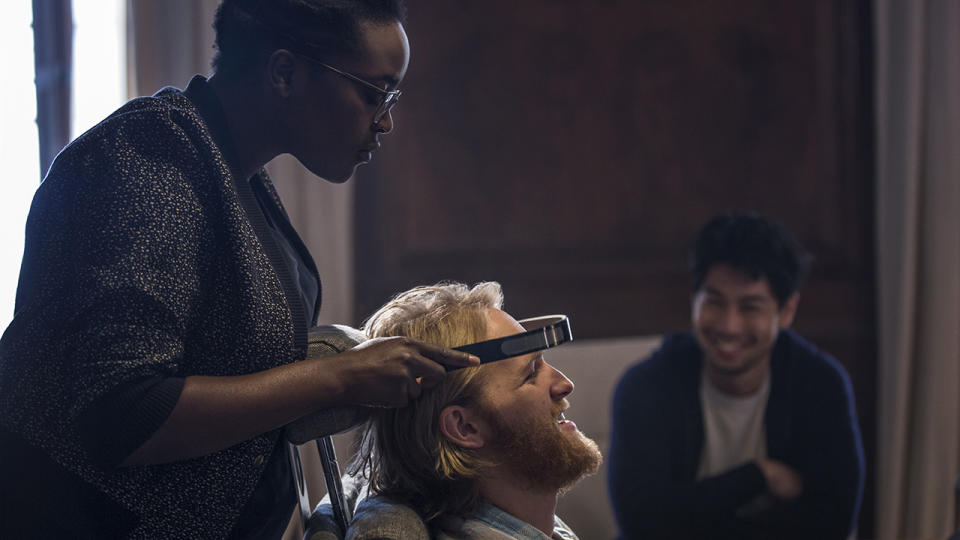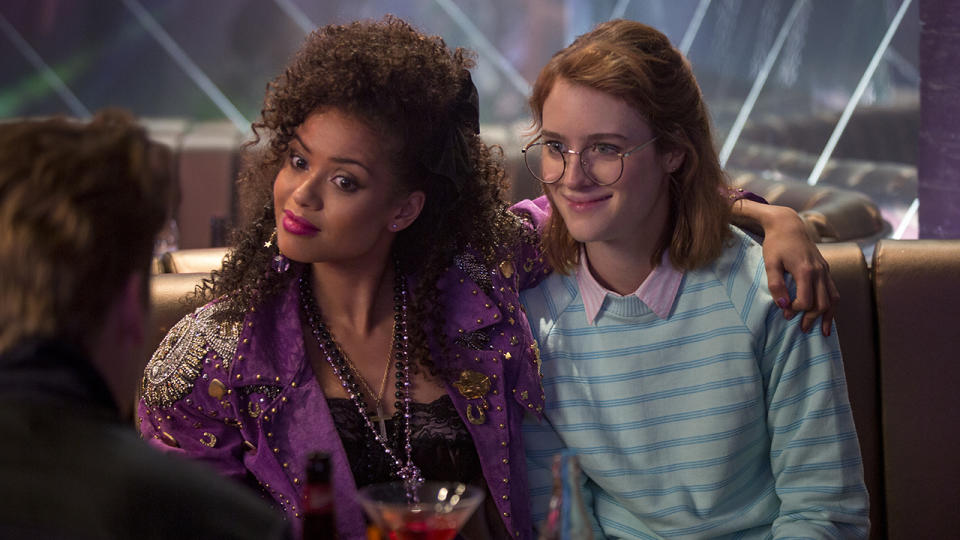Charlie Brooker: "I was genuinely worried I might be living in a computer simulation"

Words: Sam Ashurst
It’s a bright day in July, London. Black Mirror creator Charlie Brooker looks relaxed and happy as we walk into his fancy Soho hotel room to chat all things Netflix, in anticipation of his popular dystopian telly show hitting the streaming service in October.
His mood is especially remarkable considering the fact civilisation’s been gradually crumbling around everyone throughout 2016 and, as a cultural commentator, Brooker’s been paying close attention to all of it.
In fact, there’s been so much ‘news’ this year that Charlie tells us he’s about to have emergency writers meetings about his annual end of year round-up, Screen Wipe, even though it doesn’t screen until December – a first for the show.
How are they going to fit everything in? “Maybe we’ll have to do two shows at the same time. We’ll have to do a two-hour special and show it in an hour. It’s like a news bomb has gone off. June is normally quiet as fuck, usually that’s the bit of the show where we say ‘Here’s a silly reality show.’ Not this year.”
But, before that, we’ll have Black Mirror to distract us from the chaos outside our windows – and to possibly predict what’s coming next…
Yahoo: Science-fiction is known for making all sorts of predictions that come true – you’ve had one of the weirdest, the pig and the Prime Minister episode of Black Mirror (‘The National Anthem’) foreseeing the scandal involving David Cameron. How did you feel when that came out?
Charlie Brooker: “People immediately started asking me ‘Did you know?’ I didn’t! I genuinely, genuinely worried I might be living in a computer simulation. It was weird for everyone, it was f****** weird for me. Because I genuinely thought that’s too big a coincidence, how has that happened, am I real? Which isn’t a good thing to be thinking late at night. I’ve worried about all sorts of things, I haven’t seriously worried about whether I might be living in some sort of dream before.
I hope nothing from this season comes true. Actually, some of it wouldn’t be so bad.”

The Netflix episode we saw felt more like a utopia than a dystopia, which is quite different for Black Mirror – is that a reaction to the world being pretty rubbish in real life? Did you want to put some lightness in there for people?
“I didn’t want every episode to be a harrowing bleakfest, but even when we do a light episode, it’s still quite dark – poignant, or bittersweet. That said, we don’t want to be the show that looks like it was written by the Unabomber, that’s anti-technology or luddite. ‘Oh, what are young people doing now? Instagram? Boo! [shakes fist]’ It’s interesting to explore more optimistic uses of technology.
Across this season, we’ve tried to have a bit more variety. Because there’s six episodes, you don’t want it to become too predictable, so we’ve varied the tone a little more. Hopefully it’s still very Black Mirror, there’s lighter episodes and there’s darker episodes, we haven’t scrimped on the horror and the chills, there’s still a lot of that in there as well.
We’ve got different quantities of light and shade throughout [laughs].”
I’m sensing the shade might be quite dark?
“There is some shade [laughs], but there’s more light – you haven’t seen all of the light. We found it helpful to approach each story as a genre piece, even if that’s just internal short-hand.
So, we’ve got a romance, we’ve got a police procedural which is the closest we get to a Scandi noir, that’s a feature-length one. We’ve got a military thriller, we’ve got a playful satire about social media and insecurity, there’s a horror romp, there’s a grimy, gritty one set in the present day that’s got no sci-fi element at all… We’ve got a real variety of stories.
There’s a videogames theme that runs through several of the episodes. There is one episode that’s explicitly about videogames that’s called Playtest, directed by Dan Trachtenberg who did 10 Cloverfield Lane, starring Wayatt Russell. That episode is explicitly about a new gaming technology.”
And is that focus on variety also connected to the fact all the episodes are available straight away?
“It’s like trying to work out what tracks to put on an album. Because it’s launched as one collection of six, it’s been an interesting challenge to get the right balance of tone. They’re all wildly different, you want them to be different and idiosyncratic, and having different directors and actors helps with that, but you don’t want it to feel random – like you could be watching six random pieces, so keeping them the same but different is quite a challenge.”

It’s interesting you mention you’ve got a feature-length episode – with Netflix there’s no restrictions, episodes can be as long or as short as you want, within parameters. What’s that like for you as a writer?
“It’s interesting because in some ways it frees you up, and in other ways it’s quite daunting. You ask yourself ‘How long is a piece of string?’ In some ways, writing to a commercial hour and knowing you’ve got several ad breaks is quite useful when you’re writing. You can say to yourself ‘I only have to make it to the next ad break then I can go and play Doom.’ I tend to say that out loud while writing.
But, by the same token, it means the stories have expanded a little and become slightly more ambitious as a result, because you have such an ambitious platform.”
You mentioned Dan Trachtenberg, what does he bring to Black Mirror?
“He’s a bigger geek than me, I’m sure he won’t mind me saying that. He did a short film about Portal, so he was really enthusiastic about getting all sorts of references in. The episode plays to his strengths. It’s a claustrophobic, horrifying, but fun episode.”
If you could bring any director in for an episode of Black Mirror, who would you choose?
“Alfred Hitchcock, he’d be f**king amazing. Imagine the publicity! ‘They dug him up, put a computer into his head and he’s back! The master is back!’
I’d love to do one with Duncan Jones, he’d be a really good fit. We’ve had such fantastic directors though, and there’s a lot of directors we’d definitely return to as well. But Hitchcock, definitely Hitchcock.”

They got Humphrey Bogart into an episode of Tales From The Crypt, so maybe Hitchcock could star in an episode? You never know…
“You could do a story about an AI that emulates Hitchcock from watching all of his movies… There you go, there’s one! Imagine that, that’s no tall order is it? It would require us to shoot scenes that look like Alfred Hitchcock, brilliantly. ‘The Hitchcock Bot.’ Actually, that sounds f****** awful, doesn’t it?”
Because you’ve carefully curated the sequencing, do you want everyone to watch the episodes in the order they go up, or are you happy for people to jump around?
“If anyone deviates from the path, that’s it, they’re out.
No, people can watch it in any order they want. When the shows first went up on US Netflix, it was interesting to see people comply lists of episodes they liked, and the ones they hated. They’d say ‘Start with this one, or skip this one, watch them in this order…’ So it’s up to people in terms of how they tackle them.
It is like a box of chocolates, to use a cliche. Who eats chocolates sequentially? That would be weird.”
To extend your metaphor, it sounds like maybe one of the episodes has a razor blade hidden inside?
“[laughs] They’re all dark chocolates, they’re definitely all dark chocolates. One of them’s got a razor blade, another one’s got two razor blades [laughs].”
Black Mirror is available to watch on Netflix now.
Read more:
What happened to the cast of The Munsters?
The animation genius who took on Disney
The other Dr. strange film

 Yahoo Movies
Yahoo Movies 
